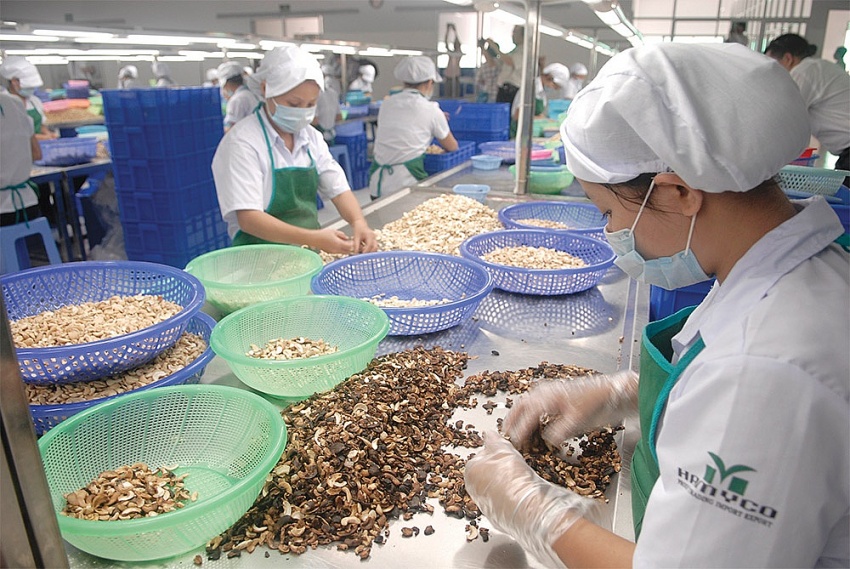CPTPP gains to be built on expansion
The deal (CPTPP) has created a system of rotating chairmanship based on the order of the agreement’s ratification. In 2024, Canada is chairing the CPTPP Commission, working to advance the agreement in a manner that reflects the interests of partners, businesses, civil society, and the public.
One of the key priorities for Canada is to develop an effective path forward on accession. This priority will be guided by the Auckland Principles, which state that the CPTPP is open to accession by any economy that is willing and able to meet its high standards, has a demonstrated history of compliance with their existing trade commitments, and can achieve the consensus of members.
 |
| CPTPP gains to be built on expansion |
For example, despite being formally signed in 2023, the United Kingdom’s entry into the CPTPP only takes effect this year, following the completion of domestic legal processes by the British parliament. Joining is considered the UK’s most significant trade agreement since its departure from the European Union.
At last week’s meeting between Vietnamese Deputy Minister of Foreign Affairs Le Thi Thu Hang and UK Permanent Under-Secretary of the Foreign Office, Sir Philip Barton, both sides agreed to closely cooperate with each other to well make the most of the UK-Vietnam Free Trade Agreement and boost cooperation in the sectors of finance-banking, education and training, science and technology, and maritime economy, while also deepening trade and investment.
Emily Hamblin, British consul general in Ho Chi Minh City, told VIR that the CPTPP offers the UK and Vietnam an expanded platform for trade liberalisation, market access, and regulatory harmonisation. Its provisions facilitate streamlined customs procedures, accelerated tariff reductions and enhanced intellectual property rights.
“All of this contributes to the creation of a conducive environment for businesses to thrive,” Hamblin said. “By joining this dynamic and diverse trade bloc, the UK has gained access to a market of over 500 million people. This not only strengthens our trade links with Vietnam but also broadens the horizons for British businesses, enabling them to tap into new markets and forge supply chains across the Asia-Pacific region.”
In 2023, total trade in goods between the UK and Vietnam reached $5.92 billion, including Vietnam’s exports of $6.42 billion, up 88.5 per cent on-year; and imports of $799 million, up 87.6 per cent on-year.
Cumulatively, as of March 20, the UK had more than 560 valid projects in Vietnam, registered at $6.3 billion.
The CPTPP is a free trade agreement in-force between Vietnam and 10 other countries in the Indo-Pacific region, including Australia, Canada, Brunei, Chile, Japan, Malaysia, Mexico, New Zealand, Peru, and Singapore.
According to the Ministry of Foreign Affairs, Vietnam is expected to see many opportunities in expanding trade and investment cooperation with potential new members of the CPTPP. Taking effect for Vietnam in January 2019, it is considered one of the best solutions as it offers flexible mechanisms for dealing with investment obstructions as well as trade facilitation.
China, Ecuador, South Korea, Thailand, the Philippines, Columbia, Uruguay, and others have all expressed interest in joining the CPTPP, which currently represents a free trade area worth about $11 trillion in aggregate GDP.
In 2022, South Korea expressed its desire to join, as it seeks to diversify its export portfolio amid heightened economic uncertainty. Currently, this nation has yet to submit its official application, pending completion of its domestic procedure requirements. It conducted countless informal and formal consultations with every member country at every level of the government hierarchy.
Accession would help expand trade and investment for South Korea, raising its GDP by 0.33-0.35 per cent annually, the state-run Korea Institute for International Economic Policy estimated.
Meanwhile, the Thai government has continuously expressed interest in joining the 11-member mega trade bloc. Thailand considers the agreement an effective tool for recovering and developing its economy, and making industries such as electronics and agriculture more competitive against rivals such as Vietnam and Malaysia, which are both members.
Nguyen Lan Phuong from law firm Baker McKenzie Vietnam told VIR that the expanded CPTPP will benefit Vietnam significantly.
“It is a modern and forward-looking trade agreement, with cutting-edge provisions in digital trade and e-commerce. In the technology-driven era, collaboration in technological advancements is imperative for sustained and resilient economic growth, and will open up new avenues for cooperation in emerging sectors,” Phuong said.
“The Vietnamese government has been revising regulations with a view to taking full advantage of its benefits and its enormous market, such as the data privacy protection decree and social media tax administration regulations. An expanded CPTPP is good news for supply chains in Vietnam,” Phuong added.
On the downstream side, she continued, Vietnam origin goods already enjoy a cost advantage over competitor non-agreement goods via lower import tariff rates and streamlined trade procedures in the existing member markets of Australia, Canada, Japan, Mexico, New Zealand, Peru, and Singapore. Adding new members will expand consumer markets for Vietnam origin goods.
“An expanded CPTPP would allow manufacturers to source materials from additional markets, without forfeiting the benefits offered. Accordingly, expansion will allow for more dynamic and agile supply chains within the trading block,” Phuong said.
| Commitments on import duties from CPTPP members for Vietnam CPTPP members eliminate import duties of 97-100 per cent tariff lines for goods originating from Vietnam. Most Vietnamese goods when imported into CPTPP members will be subject to import duties of zero immediately when the agreement enters into force. Some preferential import duty commitments of CPTPP members are as follows: - Canada commits to eliminating import duties on 95 per cent of tariff lines, which is equivalent to 78 per cent of exports from Vietnam to Canada when the agreement enters into force. - Japan promises to remove import duties on 86 per cent of tariff lines, which is equivalent to 93.6 per cent of exports from Vietnam to Japan when the agreement enters into force, and import duties on 90 per cent of tariff lines will be zero after five years. - Peru commits to erasing import duties on 80.7 per cent of tariff lines, which is equivalent to 62.1 per cent of exports from Vietnam to Peru when the agreement takes effect, and import duties of 99.4 per cent of tariff lines will be zero after 17 years. - Mexico pledges to eliminate import duties on 77.2 per cent of tariff lines, which is equivalent to 36.5 per cent of exports from Vietnam to Mexico when the agreement becomes valid, and import duties of 98 per cent on tariff lines will be zero after 10 years. - Chile commits to phasing out import duties on 95.1 per cent of tariff lines, which is equivalent to 60.2 per cent of exports from Vietnam to Chile when the agreement enters into force, and import duties of 99.9 per cent of tariff lines will be zero after eight years. - Australia promises to remove import duties on 93 per cent of tariff lines, which is equivalent to 95.8 per cent of exports from Vietnam to Australia (about $2.9 billion) when the agreement takes effect. Import duties on other tariff lines will be zero after a maximum of four years. - New Zealand vows to eliminate import duties on 94.6 per cent of tariff lines, which is equivalent to 69 per cent of exports from Vietnam to Chile (about over $1 billion) when the agreement enters into force, and import duties on other tariff lines will be zero after seven years. - Singapore commits to erasing import duties on all tariff lines when the agreement becomes valid. - Malaysia pledges to eliminate import duties on 84.7 per cent of tariff lines when the agreement enters into force. After 11 years, 99.9 per cent of the tariff lines in Malaysia will be reduced or eliminated. - Brunei vows to remove import duties on 92 per cent of tariff lines when the agreement takes effect. Import duties of 99.9 per cent tariff lines will be zero after seven years and all tariffs will be eliminated after 11 years. Source: Vietnam’s Ministry of Industry and Trade |
 | Wide-ranging agreement opens up more diverse trade channels The Comprehensive and Progressive Agreement for Trans-Pacific Partnership (CPTPP) is set to expand its membership. Economist Raymond Mallon talked with VIR’s Thanh Dat about implications for Vietnam of expanded membership to include the United Kingdom and other countries. |
 | CPTPP milestone marks nation’s economic integration Vietnam is celebrating the fifth anniversary of its participation in the Comprehensive and Progressive Agreement for Trans-Pacific Partnership. Prof. Dr. Andreas Stoffers from the Friedrich Naumann Foundation in Hanoi reflects on the multifaceted impact of this landmark agreement on the nation’s economic landscape. |
What the stars mean:
★ Poor ★ ★ Promising ★★★ Good ★★★★ Very good ★★★★★ Exceptional
 Tag:
Tag:
Related Contents
Latest News
More News
- Kurz Vietnam expands Gia Lai factory (February 27, 2026 | 16:37)
- SK Innovation-led consortium wins $2.3 billion LNG project in Nghe An (February 25, 2026 | 07:56)
- THACO opens $70 million manufacturing complex in Danang (February 25, 2026 | 07:54)
- Phu Quoc International Airport expansion approved to meet rising demand (February 24, 2026 | 10:00)
- Bac Giang International Logistics Centre faces land clearance barrier (February 24, 2026 | 08:00)
- Bright prospects abound in European investment (February 19, 2026 | 20:27)
- Internal strengths attest to commitment to progress (February 19, 2026 | 20:13)
- Vietnam, New Zealand seek level-up in ties (February 19, 2026 | 18:06)
- Untapped potential in relations with Indonesia (February 19, 2026 | 17:56)
- German strengths match Vietnamese aspirations (February 19, 2026 | 17:40)






















 Mobile Version
Mobile Version